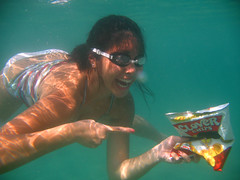Dissertation Girl Writes in Technicolor, plus: the best writing guides on the web
 This is a moment of heavy writing and editing for me -- revising dissertation chapters, cobblng together the next ones, marking up sheafs of undergraduate responses. So I have a reason for thinking about writing, and what's more, enormous incentive to think clearly.
This is a moment of heavy writing and editing for me -- revising dissertation chapters, cobblng together the next ones, marking up sheafs of undergraduate responses. So I have a reason for thinking about writing, and what's more, enormous incentive to think clearly.
My writing has slumped and slumped in graduate school, spiralling in a decline born of exhaustion, overwhelm, and neglect. Writing literature reviews for the economic literature about industrialization, for instance, wasn't the most titilating prompt for me. I entered a phase of neglect and sloppitude, from which I'm only now starting to emerge. Time to put bad habits to right.
Top priority: juicify my paragraphs about the roads. Aim for a pulitzer-worthy introduction, bursting with color and punch. Something like this:
The eighteenth-century traveler looked himself around for inspiration, directional information, and signs of the harvest, but he learned about his government in other ways. Ecstatic messengers on the post wagon told him about recent battles, and then he learned about government. Outraged neighbors told him about a case in court, and invited him to riot in protest, and then too he learned about government. The nineteenth-century individual, however, was never more alert than when on the road, and then he noticed every monument and slum around him. Government, for him, was observable in the everyday realities of life. He understood his daily walk to market as the product of government activity, and he watched it carefully for clues as to how the nation was doing. He met his friends at the coffeehouse, and they too discussed the proper realm of government control over property, alternative models of political organization, and the limits of collective and private philanthropy. They backed up their accounts with stories about other villages, harvested from the accounts of other travelers. The nineteenth-century observer was alert, critical, and precise in its assessment of the politics encoded in the signs of everyday life.
To that end, I'm revisiting the writing guides of the greats. I'm circulating them to my students, and reviewing their clear rules for vibrant diction and concise phrasing. From my del.icio.us page, here's the list:
-
Poynter Online - Writing Tools
Usethis quick list of Writing Tools as a handy reference. Copy it and keepit in your wallet or journal, or near your desk or keyboard. Share itand add to it.
-
AskOxford: Plan Before you Write
planout a core statement which says what you will cover in the main sectionof the document – normally the discussion section. It helps youto focus on the task and the audience.
-
AskOxford: Use Accurate Punctuation
Punctuationshouldn’t cause as much fear as it does. Only about a dozen marksneed to be mastered and the guidelines are fairly simple. A goodcommand of punctuation helps you to say more, say it more interestinglyand be understood at first reading. Li
-
Guidelines for Using Apostrophes Correctly
Theapostrophe may be the simplest and yet most frequently misused mark ofpunctuation in English. Here we'll review six guidelines for using themark correctly.
-
Poynter Online - Fifty Writing Tools
Attimes, it helps to think of writing as carpentry. That way, writers andeditors can work from a plan and use tools stored on their workbench.You can borrow a writing tool at any time. And here's a secret: Unlikehammers, chisels, and rakes, writing to
-
UCLA College Library: How To Narrow or Broaden Your Topic
help narrowing a research paper topic from UCLA
-
Research Papers: Hunting for Sources
advice on effective researching and note-taking from Purdue.
-
Developing a thesis
Comingup with your central idea is the biggest problem you have to solvebefore you begin to craft a defense of your ideas or write a draft ofyour essay
-
The Economist Magazine style guide
doing away with extraneous words, simplifying your language, basic capitalization for politics and history, punctuation aid.
-
George Orwell, "Politics and the English Language," 1946
rules for simple writing. skip to the end for summary. never use a long word when a short one will do.
-
Writing an Annotated Bibliography
how to research and write an annotated bibliography
-
History Matters: The U.S. Survey Course on the Web
-
Effective Writing | Grammar Rules
rules for clear writing
-
Dictionary.com Style Guide
punctuation, grammar, and more
-
Thesaurus.com
-
Half an Hour: How to Write Articles and Essays Quickly and Expertly










